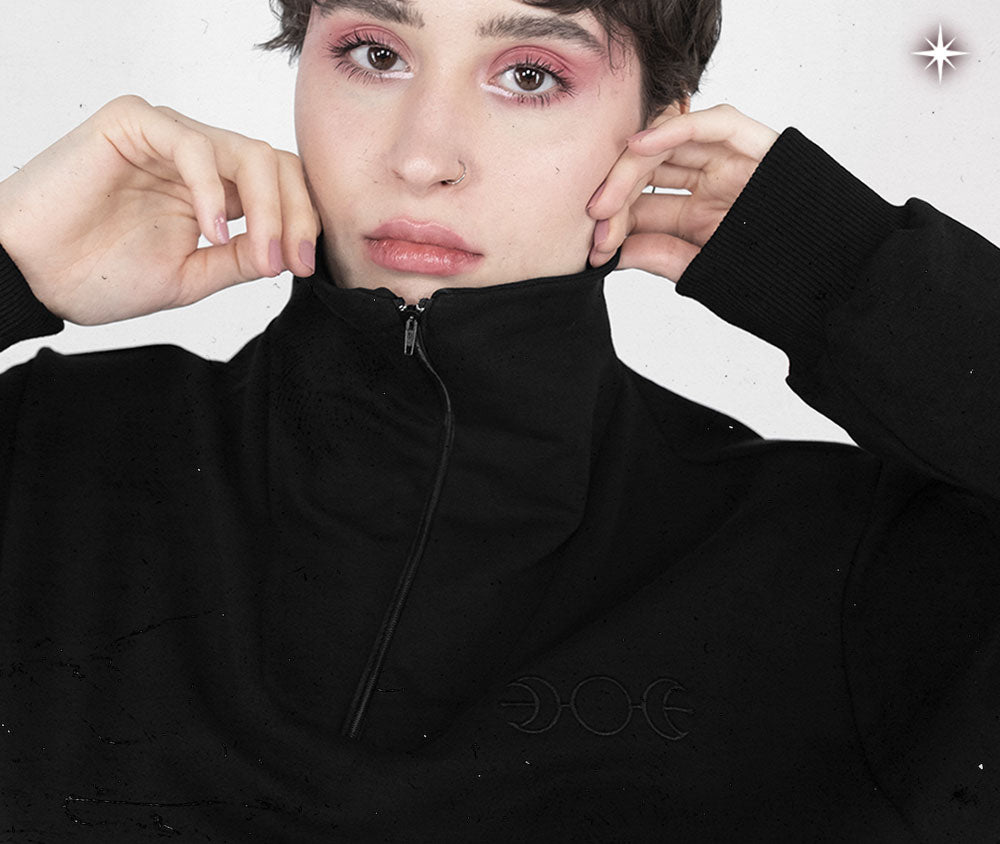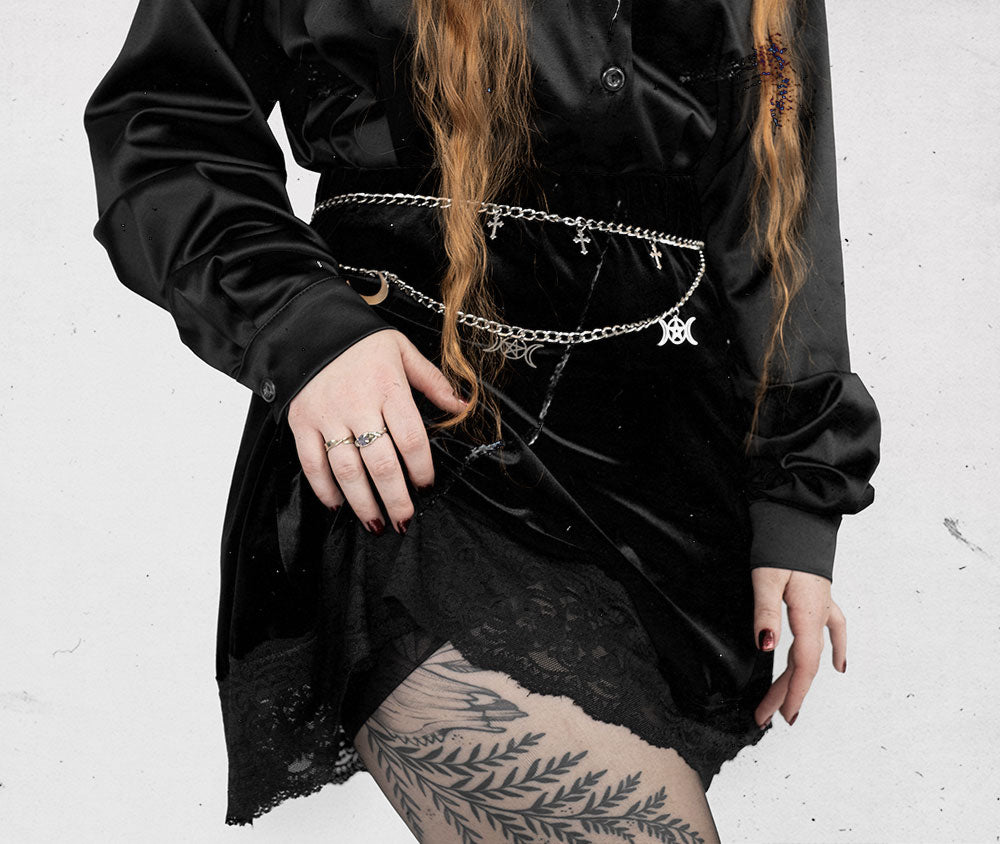How to make your products last forever?
Your dream item just arrived, and you're not sure how to take care of it? At SKYDANCE, we put a lot of focus on high-quality fabrics - we want them to stay with you for as long as possible! And for that, proper care is key. Luckily, it’s not as complicated as it might seem - just follow a few simple steps, and your clothes will be a staple in your wardrobe for years to come ♥
the care basics
1. Wash only when necessary
Contrary to popular belief, washing clothes after just one wear isn’t always needed! Frequent washing can wear out fabrics faster and cause colors to fade. Instead, hang your clothes up after wearing them to air them out- that’s usually enough. Small stains can be removed with a little water, and tougher spots can be treated with spot cleaning.
2. Check the labels
Every fabric has different needs. That’s why it’s always a good idea to check the care labels before washing - this will tell you the ideal temperature for washing, as well as how hot you can iron your garment.
3. Choose Low Temperatures
30°C is the perfect washing temperature for your clothes! Higher temperatures can cause fabrics to wear out more quickly and are also less eco-friendly. It’s also best to use a low spin cycle. Save the higher temperatures and faster spins for items like underwear and bedding.
4. Separate Colors
It might sound basic, but one mistake can cost you the beautiful color of your favorite top! Wash blacks with blacks, whites with whites, and group similar shades together for each wash to keep your clothes looking fresh and vibrant.

Our fabrics
SKYDANCE products are made in Poland. We source our fabrics from Polish manufacturers, personally testing them before they go into production.
Before a finished product makes it to our store, we go through multiple prototypes, experimenting with different cuts and putting our designs to the test. We challenge them with harsh washing conditions, high-heat ironing, and tough stains - our prototypes don’t have it easy! But that’s how we make sure that the clothes and accessories we offer can handle even the most demanding situations.
We use a wide variety of materials, but our priority is always natural fabrics like cotton, viscose, and bamboo fiber. Whenever possible, we choose certified materials, such as organic cotton or Lenzing™ Ecovero™ viscose. We know how uncomfortable synthetic fabrics can be, so we always opt for skin-friendly knits and weaves whenever we can.
Come on, let me tell you more about our fabrics!

Our fabrics
SKYDANCE products are made in Poland. We source our fabrics from Polish manufacturers, personally testing them before they go into production.
Before a finished product makes it to our store, we go through multiple prototypes, experimenting with different cuts and putting our designs to the test. We challenge them with harsh washing conditions, high-heat ironing, and tough stains - our prototypes don’t have it easy! But that’s how we make sure that the clothes and accessories we offer can handle even the most demanding situations.
We use a wide variety of materials, but our priority is always natural fabrics like cotton, viscose, and bamboo fiber. Whenever possible, we choose certified materials, such as organic cotton or Lenzing™ Ecovero™ viscose. We know how uncomfortable synthetic fabrics can be, so we always opt for skin-friendly knits and weaves whenever we can.
Come on, let me tell you more about our fabrics!
cotton —
how to care for cotton?
You can wash cotton garments at temperatures up to 60°C, but the lower, the better. It doesn’t bleed, though we still recommend sorting your laundry by color. You can tumble dry it on a mixed cycle or one specifically designed for cotton fabrics. Our knits generally don’t need ironing - just hang them up after washing, and they’ll straighten out on their own. But if you do need to iron them, always do it inside out.

viscose —
Viscose is an incredibly light, thin, and airy fabric, making it a perfect choice for hot summer days. While it’s a man-made material, it comes from a natural source - cellulose derived from trees. It has a soft, slightly heavy feel and a cool touch against the skin.
LENZING™ ECOVERO™
ECOVERO™-certified viscose is ethically sourced, with cellulose coming from sustainably managed forests. Plus, its production requires significantly less water and emits less CO2. Our LENZING™ ECOVERO™ viscose is a thick, warm fabric—perfect for chilly autumn days.
How to care for viscose?
Regular viscose should be washed at 30°C with a low spin cycle. You can tumble dry it on a "delicate" setting, but avoid fabric softeners.
LENZING™ ECOVERO™ viscose does best when washed on a wool cycle or by hand. However, if you toss it in with your regular laundry on a delicate setting, it’ll still come out just fine! 😊

viscose —
Viscose is an incredibly light, thin, and airy fabric, making it a perfect choice for hot summer days. While it’s a man-made material, it comes from a natural source - cellulose derived from trees. It has a soft, slightly heavy feel and a cool touch against the skin.
LENZING™ ECOVERO™
ECOVERO™-certified viscose is ethically sourced, with cellulose coming from sustainably managed forests. Plus, its production requires significantly less water and emits less CO2. Our LENZING™ ECOVERO™ viscose is a thick, warm fabric—perfect for chilly autumn days.
How to care for viscose?
Regular viscose should be washed at 30°C with a low spin cycle. You can tumble dry it on a "delicate" setting, but avoid fabric softeners.
LENZING™ ECOVERO™ viscose does best when washed on a wool cycle or by hand. However, if you toss it in with your regular laundry on a delicate setting, it’ll still come out just fine! 😊

polyester —
Let’s be honest - polyester isn’t the best option, either for us or the environment. That’s why we do our best to use it as little as possible. However, it can be a great addition to fabrics like viscose, making them more durable and less prone to wrinkling. When we do use polyester, we always choose the highest-quality, most durable versions available.
Some of our standout polyester pieces include our iconic mesh tops, made from fine tulle. We also have a few polyester skirts - most of them are leftovers from past collections and are available at deep discounts since there are only a handful left.
That said, we’re not totally black-and-white about polyester. We make conscious exceptions, especially for velvet. If we know a material is exceptionally high quality and works well for everyday wear, we’re not afraid to use it. And when it comes to velvet, your cost per wear will be counted in mere cents!
How to care for polyester?
You don’t have to worry about it at all. Wash it however you like—there’s no need to iron it. The materials we use are so strong they can handle just about anything. 😉

polyester —
Let’s be honest - polyester isn’t the best option, either for us or the environment. That’s why we do our best to use it as little as possible. However, it can be a great addition to fabrics like viscose, making them more durable and less prone to wrinkling. When we do use polyester, we always choose the highest-quality, most durable versions available.
Some of our standout polyester pieces include our iconic mesh tops, made from fine tulle. We also have a few polyester skirts - most of them are leftovers from past collections and are available at deep discounts since there are only a handful left.
That said, we’re not totally black-and-white about polyester. We make conscious exceptions, especially for velvet. If we know a material is exceptionally high quality and works well for everyday wear, we’re not afraid to use it. And when it comes to velvet, your cost per wear will be counted in mere cents!
How to care for polyester?
You don’t have to worry about it at all. Wash it however you like—there’s no need to iron it. The materials we use are so strong they can handle just about anything. 😉
Accessories care
If you want to learn how to care for your accessories, click the button below! ♥

